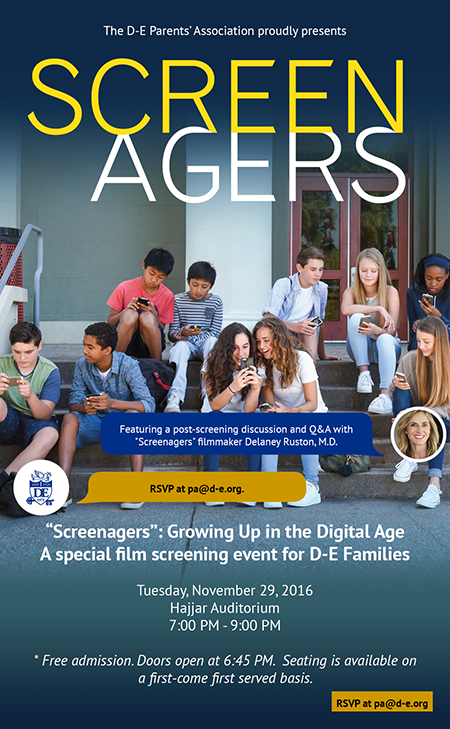ScreenAgers at School
We hope you had the opportunity to enjoy the recent screening of “ScreenAgers : Growing Up in the Digital Age” organized by the D-E Parents Association. At school, some students (those with room in their schedules) were able to view the entire film on the morning of December 1st and participated in a discussion with their deans about what they notice about their own technology use and what they found interesting about the film. During the week of December 5th, the whole Middle School had an assembly about screen-use habits and internet safety lead by expert, Mr. James (Skeeter) Lee.
At school, we are finding the conversations about screen use, both with students and among educators here and in the nation in general, very interesting because we feel it is important for young adults, especially, to be critical consumers of material available on the internet and to develop the self control to use technology productively and selectively, rather than allowing it to take over their attention in ways they did not plan. As one student comically put it, “Sometimes I go on the internet to get the definition of a word quickly, and an hour later I find I am learning how to talk to a giraffe.” In our post-screening discussions with students, the deans were struck by how aware our students are of both the tremendous benefits of using technology and of the dangers of getting “sucked in and off task.” We heard some students share how they have internalized the messages teachers at school (and the acceptable use contracts all students sign) deliver about using technology wisely as a “tool for school” and enjoyed them sharing the many ways they have designed to limit their own screen time and help themselves to stay on task.
Most students (as indicated by a show of hands during our discussions) appreciate the limits we have in place at school and those they have at home. They many not LIKE it, but they know they need help keeping screentime and technology use in its proper place in their lives. Limits set at home and at school model good screen/tech use for students and help them to develop good habits. As educators and parents, we know that youngsters at this age are still developing the ability to control their attention and to use good judgment consistently. As the movie put it, their brains seek stimulation, and the discipline of controlling attention works against that natural impulse. The practice screen limits gives students in controlling their attention, and the prompting (and sometimes stronger responses such as removing a device for a time or sending a student to talk to his or her dean) teachers give help students to develop a larger sense of when they are off task and can open discussion about strategies for controlling their own choices about technology use.
Limits we have at school , such as our “no cell phones during the school day,’ “no unauthorized apps,” “the cafeteria is a tech-free zone,” and “no internet use without teacher permission in class” policies (see your child’s acceptable use contract for a more complete list) also help students to “compartmentalize” their screen use and to recognize the difference between using technology to advance their work in school and recreational use. Keeping devices out of the cafeteria, or limiting the use students make of their devices at school also helps preserve time and practice with face-to-face interactions that are so important for developing the collaborative skills we value. Over time, with consistent reinforcement, that teacher or parent voice that says “come back to task” or “ that’s enough rec use” should become internalized and help our children to be increasingly controlled, deliberate and critical users of technology as they design full, rich lives for themselves that include a wide range of wholesome activities.

